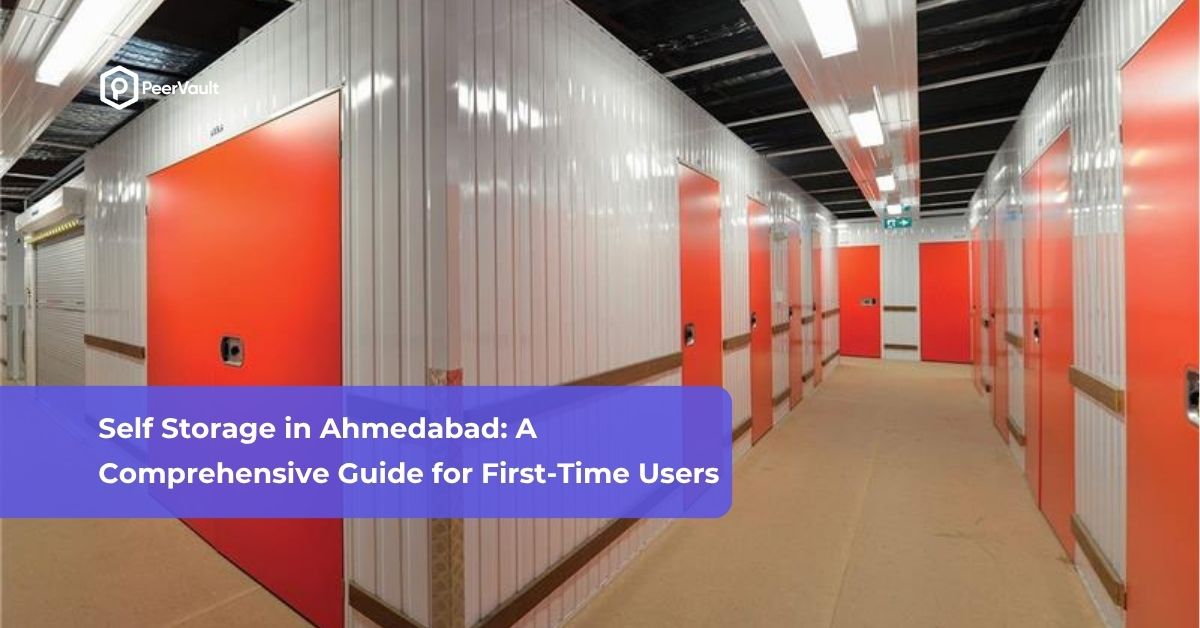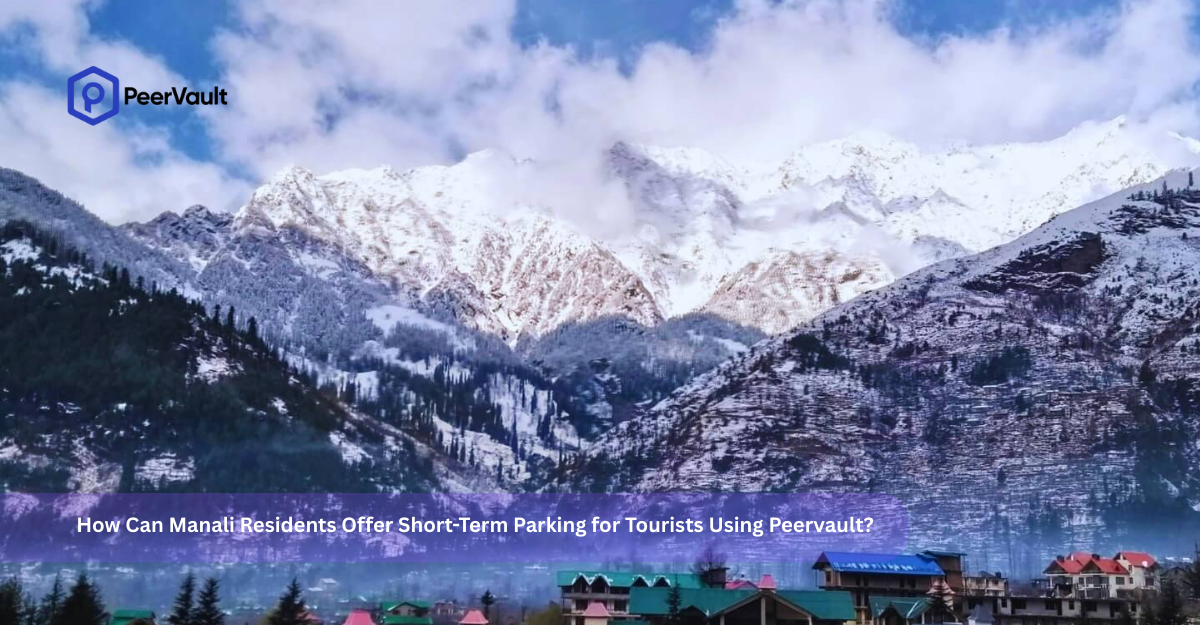Self Storage in Ahmedabad: A Comprehensive Guide for First-Time Users

Self-storage enables people, families, and companies to rent safe areas, such as rooms, lockers, or tiny units, for a brief or extended period of time. These spaces store everything from personal belongings to business inventory, usually with flexible month-to-month rentals. Self Storage in Ahmedabad: A Comprehensive Guide for First-Time Users explains how this service helps residents and businesses manage space efficiently without extra property costs.
In rapidly growing cities like Ahmedabad, the need for efficient space management is becoming more urgent. With increasing urbanization, residential homes are becoming more compact, and commercial real estate is growing more expensive. Families often find themselves struggling to accommodate belongings during transitions such as moving, home renovations, or life events like weddings or international relocations. Students, professionals, and migrant workers frequently need temporary storage options when shifting accommodations or returning to their hometowns during holidays or semester breaks.
Moreover, Ahmedabad’s thriving economy especially the growth of e-commerce and small businesses has led to a rise in demand for micro-warehousing solutions. Many entrepreneurs and online sellers are now looking for affordable ways to store products without committing to full-scale warehouses or long leases. Self-storage offers an ideal middle ground.
This comprehensive guide is designed specifically for first-time self-storage users in Ahmedabad. It answers common questions like: How does self-storage work? What can I store? How much does it cost? Is it secure? We’ll also explain the differences between traditional storage facilities and newer, more flexible peer-to-peer (P2P) models like PeerVault, which connect users with spare spaces hosted by locals.
Whether you’re a homeowner, student, business owner, or someone in between, this guide will help you confidently navigate self-storage in Ahmedabad.
Why is Self-Storage Gaining Traction in Ahmedabad?
Self-storage is becoming increasingly popular in Ahmedabad due to several key factors:
1. Urbanization and Space Constraints: Ahmedabad’s rapid urbanization has led to smaller living spaces, making it challenging for residents to store belongings. Self-storage units offer a practical solution by providing secure, off-site storage options that free up space at home or in the office.
2. E-commerce Growth: The rise of online shopping has led to an increase in inventory for small businesses and e-commerce sellers. Self-storage facilities offer affordable warehousing solutions, allowing businesses to store products without the need for expensive commercial real estate.
3. Mobility and Transitions: With a transient population, including students, professionals, and migrants, there is a constant need for temporary storage during relocations, travel, or transitions. Self-storage units cater to this demand by offering flexible rental terms and secure storage options.
4. Decluttering and Minimalism Trends: As individuals embrace minimalist lifestyles and seek to declutter their living spaces, self-storage provides a convenient way to store items that are not frequently used but still hold value.
5. Security and Accessibility: Modern self-storage facilities in Ahmedabad offer enhanced security features, including 24/7 surveillance, access control, and climate-controlled units, ensuring the safety and preservation of stored items.
In summary, the combination of urban growth, changing lifestyles, and evolving business needs is driving the demand for self-storage solutions in Ahmedabad, making it a practical choice for individuals and businesses seeking flexible and secure storage options.
Self-Storage Market in Ahmedabad: Size, Demand Drivers, and Growth Projections
In response to the increasing demand for adaptable, safe, and reasonably priced storage options, the self-storage industry in India is a developing business. The fast growing city of Ahmedabad is becoming into a hub for this movement. With increasing urban density, shrinking living spaces, and a booming business environment, residents and entrepreneurs alike are turning to self-storage as a practical solution.
This article provides an in-depth analysis of the self-storage market in Ahmedabad, highlighting its size, growth drivers, and future projections. We also explore the national landscape to contextualize Ahmedabad’s place within India’s evolving self-storage ecosystem.
National Market Overview: Size and Growth Projections
India’s self-storage market, though still nascent compared to western economies, is witnessing strong growth. According to industry reports, the market was valued at approximately ₹18,260 crore (₹182.6 billion) in 2024, equating to around USD 2.2 billion. This figure is expected to surge to nearly ₹29,880 crore (₹298.8 billion) by 2033, reflecting a healthy compound annual growth rate (CAGR) of 5.1% between 2025 and 2033 (IMARC Group, 2024).
Another report by Grand View Research estimates the market at ₹15,853 crore (₹158.5 billion) in 2024, with a projected rise to ₹24,990 crore (₹249.9 billion) by 2030. This suggests a faster CAGR of 8.2%, underscoring increasing investor confidence and consumer adoption (Grand View Research, 2024).
Growth drivers at the national level include:
- Tier 1 and Tier 2 cities are rapidly becoming more urbanized.
- Increasing disposable incomes.
- Smaller housing footprints and rising real estate prices.
- Expanding e-commerce sector requires scalable warehousing.
- Growing awareness and acceptance of self-storage solutions.
Urbanization and Housing Pressure in Ahmedabad
Ahmedabad is one of India’s fastest-growing urban centers. Its population is approximately 7.7 million (77 lakh) as of 2023, with the broader urban agglomeration nearing 8.8 million (88 lakh).
The city’s rapid population growth has intensified pressure on housing. Increasing demand for affordable accommodation means new apartments and homes are designed with smaller square footage to maximize space efficiency. Reports show that the average size of a residential unit in Ahmedabad has shrunk by 10-15% over the last decade, pushing residents to find external storage solutions.
This shrinking living space is a significant factor propelling demand for self-storage. Homeowners, tenants, and even businesses look for flexible options to store seasonal items, excess furniture, documents, or business inventory safely and cost-effectively.
Drivers of Growth in Ahmedabad’s Self-Storage Market
1. Migration: Students and IT Professionals
Ahmedabad’s expanding education and IT sectors have attracted a steady influx of students, young professionals, and migrants from other states. For these transient populations, permanent storage isn’t practical or affordable. Self-storage units provide a convenient solution during moves, semester breaks, or job changes.
For example, a student moving back home for vacations or relocating for internships can safely store belongings in secure storage units, avoiding the hassle of carrying heavy luggage or leaving items vulnerable.
2. Seasonal Storage Needs: Festivals and Weddings
India’s vibrant culture includes large-scale festivals, weddings, and social gatherings that often require significant storage for decorations, gifts, equipment, and clothing. These events usually last for a limited time but necessitate bulky storage during off-seasons.
Self-storage facilities allow families and event organizers in Ahmedabad to declutter their homes and event spaces, storing items safely until needed again, which enhances convenience and space optimization.
3. Small and Medium Enterprises (SMEs) Needing Affordable Inventory Space
Ahmedabad hosts a thriving SME sector, including retailers, wholesalers, and manufacturers who often struggle to manage inventory without investing in large warehouses. Self-storage offers a scalable, cost-effective alternative.
By renting small to medium-sized units on flexible terms, SMEs can efficiently manage stock fluctuations, seasonal products, and excess inventory without the overhead of traditional warehousing leases.
4. Rising E-commerce Seller Base
India’s e-commerce market is expected to develop at a projected CAGR of 18.7% through 2028, reaching an estimated ₹12.22 lakh crore (₹12.22 trillion) in 2024. Ahmedabad, as a commercial hub, has seen a surge in e-commerce entrepreneurs and online sellers.
These sellers require flexible storage that can expand or contract with their business needs, making self-storage an ideal option. The city’s increasing need for self-storage facilities is mostly due to this trend.
Market Size and Demand in Ahmedabad
While exact numbers for Ahmedabad’s self-storage market size are still developing due to the sector’s nascence, local real estate and commercial reports show an increasing supply of storage units and facilities.
Real estate consultancies like Knight Frank India and CBRE India report a 15-20% annual increase in storage unit demand in Ahmedabad’s commercial zones over the past 3 years. This growth correlates with rising urban density, expanding businesses, and shifting lifestyles.
Peer-to-peer self-storage platforms like PeerVault are gaining traction in Ahmedabad, providing cost-efficient alternatives by connecting storage seekers with local hosts who have spare space. This model further stimulates demand by increasing availability and affordability.
Growth Projections for Ahmedabad’s Self-Storage Market
Given Ahmedabad’s demographic and economic trends, the self-storage market is poised for robust growth. Projections suggest:
- An annual growth rate of 15-20% in storage unit rentals driven by urban migration and business expansion.
- Increasing adoption among individuals seeking decluttering solutions and flexible storage during life transitions.
- Expansion of storage services into suburban and newly developing localities of Ahmedabad.
- Growth in peer-to-peer storage platforms complementing traditional storage operators, providing more options and driving competition.
Taking into account local economic conditions and consumer behavior, Ahmedabad’s self-storage sector may reach a worth of ₹300–400 crore (₹3–4 billion) by 2030, matching national forecasts.
How Self Storage Works in Ahmedabad
Self-storage is becoming an increasingly popular solution for individuals and businesses in Ahmedabad who need flexible, secure, and affordable space to store their belongings. But how does self-storage work in Ahmedabad? Can you rent storage space from individuals or businesses? This guide explains the different types of self-storage options available in the city, rental procedures, typical use cases, and legal considerations involved.
Traditional Self-Storage vs. Peer-to-Peer (P2P) Model in Ahmedabad
Traditional Self-Storage
In Ahmedabad, traditional self-storage involves renting a dedicated storage unit or locker from a commercial facility. These facilities operate much like mini-warehouses and offer various unit sizes, ranging from small lockers to larger rooms that can accommodate furniture, boxes, or business inventory.
Traditional self-storage companies own the physical infrastructure and offer security features such as CCTV surveillance, gated access, climate control, and sometimes insurance options. Customers typically rent these units on a monthly basis, with contracts that can often be renewed or cancelled with short notice.
Peer-to-Peer (P2P) Self Storage: The PeerVault Model
A newer, disruptive model gaining traction in Ahmedabad is peer-to-peer self-storage, exemplified by platforms like PeerVault. Instead of renting from centralized warehouses, users rent storage space from individuals or businesses who have extra room available in their homes, shops, or commercial properties.
This model offers multiple benefits:
- Cost-Effectiveness: Because space providers monetize unused areas, prices are often lower than traditional facilities.
- Convenience: Storage locations tend to be more diverse and closer to the user’s home or workplace.
- Flexibility: Rental durations can be shorter or more negotiable, accommodating varied storage needs.
PeerVault acts as a trusted platform facilitating safe transactions, communication, and agreements between storage seekers and hosts.
Monthly and Weekly Rental Basics in Ahmedabad
To accommodate both short-term and long-term demands, the majority of Ahmedabad’s self-storage companies give variable rental durations.
Rental Duration
- Monthly Rentals: The most common rental period, ideal for people who require ongoing storage, such as small businesses managing inventory or families decluttering for a season.
- Weekly Rentals: Some providers, particularly P2P hosts, allow week-by-week rentals, which benefit students, temporary workers, or people undergoing home renovations.
Pricing Factors
Rental prices vary depending on:
- Unit Size: Small lockers cost less, while larger rooms command higher fees.
- Location: Storage spaces closer to central Ahmedabad or residential areas may cost more due to convenience.
- Security Features: Climate control, CCTV, and 24/7 access can increase prices.
- Rental Model: Traditional facilities tend to have fixed pricing; P2P spaces may offer negotiable rates.
Booking Process
Whether using traditional or P2P services, the rental process is straightforward:
1. Browse and Select: Users review available units or hosts online or in person.
2. Inspect Space: Many providers allow in-person visits or provide photos/videos.
3. Sign Agreement: Rental contracts clarify terms, payment, and access rules.
4. Payment: Usually done monthly or upfront via digital payment platforms.
5. Move-In: Customers bring their items to the storage unit during allowed access hours.
What Is Typically Stored? Case Examples from Ahmedabad
Self-storage is used by a wide spectrum of people and businesses in Ahmedabad, reflecting the city’s diverse needs.
Students
Students often use storage units during semester breaks or when relocating between hostels and family homes. For instance, a university student might store textbooks, clothes, and electronics securely rather than transporting them every vacation.
Couples and Families
Young couples or families living in compact apartments rent storage to keep seasonal items, extra furniture, or household goods that don’t fit into their current living spaces. For example, during festival seasons like Navratri or Diwali, families may store decorations or traditional attire for easy access.
Shopkeepers and SMEs
Shopkeepers and small business owners frequently need more space for inventory. A local boutique owner may use storage units to keep seasonal stock, excess supplies, or promotional materials safely and organized without renting costly commercial warehousing.
E-commerce Sellers
With Ahmedabad’s growing e-commerce ecosystem, many online sellers use self-storage to hold products and packaging materials. By doing this, varying stock volumes can be managed without committing to long-term warehouse agreements.
Legalities and Documentation Needed for Self Storage in Ahmedabad
Using self-storage in Ahmedabad involves some legal and procedural considerations to protect both renters and providers.
Identification and Verification
Most self-storage providers, whether traditional or P2P, require renters to provide valid government-issued identification such as:
- Aadhaar Card
- PAN Card
- Passport
- Voter ID
This verification ensures accountability and security for stored goods.
Rental Agreement
It is customary to have a formal leasing agreement or contract. This document outlines:
- Rental duration and payment terms
- Guidelines for using and accessing the storage unit
- Liability clauses regarding damage, theft, or loss
- Termination conditions and notice periods
P2P platforms like PeerVault facilitate creating legally binding agreements to protect both parties and mediate disputes if they arise.
Insurance
Although it is not necessary, renters might choose to insure their possessions. Some traditional facilities offer insurance as an add-on, while P2P platforms might recommend third-party insurance options.
Permissible Items and Prohibited Goods
Storage providers in Ahmedabad typically restrict storing hazardous, flammable, perishable, or illegal items to comply with local laws and safety regulations. Common prohibited items include:
- Explosives or chemicals
- Perishable food
- Weapons or firearms
- Illegal substances
Clear communication of these restrictions is usually part of the rental agreement.
Access Rights and Security
Storage renters should understand access policies, such as:
- Hours during which the unit can be accessed
- Whether 24/7 access is available
- Rules for granting third-party access (e.g., family members)
Security measures like CCTV, alarms, and restricted entry points are standard, especially in traditional facilities.
What Can You Store in a Storage Unit in Ahmedabad?
Self-storage units in Ahmedabad have become a go-to solution for people looking to declutter, downsize, or manage temporary space shortages. But if you’re considering renting a storage unit whether it’s for your home, small business, or a major life transition you might wonder: What exactly can you store in one? Let’s break it down in simple terms, so you know what’s okay (and what’s not).
Personal Storage: What Individuals Commonly Store
For most people, self-storage starts with everyday household items. Here’s what you can usually store:
1. Furniture
Got an extra sofa, dining table, or old cot that doesn’t fit in your current flat but might be useful later? Self-storage units are perfect for that. Whether you’re moving, renovating, or just trying to free up space, you can safely store:
-
Beds and mattresses
-
Chairs, sofas, tables
-
Wardrobes and cabinets
Tip: Use covers or bubble wrap to protect wooden and upholstered items from dust or scratches.
2. Books, Documents, and Personal Files
Ahmedabad has a large student and academic community. If you’re a book lover or someone who needs to archive paperwork self-storage is ideal. Make sure the unit is dry and ventilated to avoid moisture damage.
3. Clothing and Seasonal Items
Heavy winterwear, wedding outfits, or Navratri costumes that you only use once a year? Don’t let them take over your closet. Pack them in sealed boxes or vacuum bags and store them away until the next festive season.
4. Electronics and Appliances
Are you improving your house or moving to a new location? You can store:
-
Mixers, microwaves, fans, and even refrigerators (if cleaned and defrosted first)
-
Laptops or older desktop computers
Just remember to pack electronics securely and, if possible, in their original boxes.
Business Storage: For Shopkeepers, Freelancers & Startups
Self-storage isn’t just for personal use it’s increasingly popular with small businesses and freelancers in Ahmedabad.
1. Inventory
If you run a boutique, online store, or small retail business, you can use self-storage to hold:
-
Extra stock
-
Packaging materials
-
Festive or promotional merchandise
This is especially helpful if you work from home but don’t want your home to look like a warehouse.
2. Office Supplies and Equipment
Freelancers, architects, or photographers often need to store gear they don’t use daily. Items like:
-
Printers and office chairs
-
Camera gear and lighting equipment
-
Blueprints, marketing materials, or samples
Storing them in a secure, accessible unit can free up precious space in your workspace.
What You Can’t Store: Know the Rules
While self-storage units are flexible, there are some clear restrictions to keep everyone safe and compliant with local laws.
1. Perishable Food
Fresh fruits, vegetables, or anything that rots or smells is a big no. They can attract pests and create sanitation issues.
2. Hazardous or Flammable Items
Think of things like:
-
Gas cylinders
-
Paint thinners
-
Firecrackers
-
Acid, batteries, or chemicals
These pose a serious fire or explosion risk and are strictly prohibited.
3. Live Animals or Plants
No pets, livestock, or even potted plants are allowed in storage units. Storage spaces are not ventilated or designed for living beings, and it’s unsafe and illegal to keep them there.
4. Illegal Items
Anything that’s against the law like stolen goods, unlicensed weapons, or narcotics cannot be stored. Providers often inspect units and can report suspicious activity.
Cost of Self Storage in Ahmedabad
How much does self storage cost in Ahmedabad?
If you’ve been asking this question while running out of space in your flat or shop, you’re not alone. With rising real estate costs and shrinking homes, many residents in Ahmedabad from college students to business owners are exploring self storage as a practical solution. But how much does it really cost? And is it cheaper than renting an extra room or flat?
This guide breaks down the actual cost of self storage in Ahmedabad, explains what affects pricing, and compares traditional warehouse-style storage to modern peer-to-peer platforms like PeerVault.
Average Price of Self Storage in Ahmedabad
The cost of self storage in Ahmedabad typically ranges from ₹20 to ₹60 per square foot per month, depending on the location, type of storage, and duration.
Here’s a quick look at estimated monthly rates in some popular areas:
Area | Traditional Storage (₹/sq. ft) | PeerVault (P2P) (₹/sq. ft) |
Navrangpura | ₹45 – ₹60 | ₹25 – ₹40 |
SG Highway | ₹35 – ₹50 | ₹20 – ₹30 |
Satellite | ₹40 – ₹55 | ₹25 – ₹35 |
Maninagar | ₹30 – ₹45 | ₹20 – ₹30 |
Chandkheda | ₹25 – ₹40 | ₹18 – ₹28 |
Note: These prices are approximate and vary based on amenities, space size, and availability.
Traditional Storage vs. PeerVault (P2P Model)
Traditional Storage Facilities
These are purpose-built storage warehouses offering secure, lockable units with features like:
-
CCTV surveillance
-
Fire safety
-
24/7 access (in some cases)
-
Climate-controlled rooms (for delicate items)
But with these features comes a higher price tag, especially in central or high-demand areas like Navrangpura or Satellite.
PeerVault (P2P Self Storage)
Peer-to-peer self storage platforms like PeerVault allow individuals and small businesses to rent out spare rooms, garages, basements, or office corners to others who need storage. Since these are underused private spaces, the prices are often 30-40% lower than commercial facilities.
Benefits of PeerVault-style storage:
-
More affordable
-
Located within residential neighborhoods
-
Often more flexible with timing and rental duration
-
Hosts are usually nearby, making access more convenient
So, if you’re wondering, “Is self storage cheaper than renting a flat?”, the answer is a clear yes. For instance, renting a 100 sq. ft. storage unit via PeerVault may cost ₹2,500/month, while renting a 1BHK flat in the same area just for storage could set you back ₹10,000–₹12,000/month—and you’d still be paying maintenance and utilities.
Factors That Affect the Price of Self Storage
1. Location
Just like real estate, location plays a big role in self storage pricing. Central and commercial areas (like CG Road, Satellite, and Prahladnagar) tend to be more expensive than residential outskirts like Chandkheda or Nikol.
2. Duration of Storage
Many providers offer discounts for long-term bookings. A 12-month rental plan might save you 10–20% compared to a month-to-month lease. PeerVault hosts, especially, are more flexible and may negotiate better deals for longer stays.
3. Size of the Unit
Storage units usually range from 10 sq. ft. lockers for suitcases and boxes to 200+ sq. ft. units for furniture, business stock, or appliances. Although the price per square foot tends to reduce as unit size grows, the cost does, of course, increase with unit size.
4. Type of Access
24/7 access, drive-in convenience, or pickup/drop services can increase pricing. Traditional facilities typically charge more for extended hours, while P2P hosts may be more accommodating without added costs.
5. Climate Control and Security
If you’re storing items like electronics, paintings, or documents, climate-controlled units are essential but they come at a premium (typically ₹10-₹15/sq. ft. more). Basic storage spaces without climate regulation are fine for most general items and cost less.
Transparent Pricing Examples
Let’s say you’re a college student storing a few boxes and a suitcase:
-
Space Needed: 20 sq. ft.
-
PeerVault Host in Chandkheda: ₹20 x 20 = ₹400/month
-
Traditional Facility in Navrangpura: ₹50 x 20 = ₹1,000/month
Now, imagine you’re an online seller needing space for inventory:
-
Space Needed: 100 sq. ft.
-
PeerVault Storage in SG Highway area: ₹30 x 100 = ₹3,000/month
-
Commercial Storage Unit in Satellite: ₹50 x 100 = ₹5,000/month
The savings are clear and with P2P models, users often get added flexibility and local accessibility.
How to Choose the Right Storage Provider
Renting a self-storage unit is a practical solution when you’re running out of space at home, moving to a new place, or just need somewhere safe to keep your stuff. But with so many providers out there especially in a growing city like Ahmedabad how do you decide which one to trust? If you’ve ever wondered, “What should I check before renting a storage unit?” or “What are some tips for selecting a safe self-storage facility? you’re in the right place.
Choosing the right storage provider involves more than just finding the cheapest rate. You want to feel confident that your belongings are safe, accessible, and in good hands. Before making a decision, consider these factors.
1. Location and Accessibility
Start by looking for storage units that are close to your home, office, or the location where you’ll need frequent access to your items. It may be tempting to pick the cheapest unit on the outskirts of the city, but if you need to drive an hour every time you need something, the inconvenience might outweigh the savings.
For example, if you’re a college student at Gujarat University, choosing a storage space in Navrangpura or Naranpura is more sensible than one in a far-off industrial zone. Similarly, if you’re a small business owner operating from SG Highway, having a unit nearby could save you time and transportation costs.
Also, check access hours. Some storage providers allow 24/7 access, while others limit it to business hours. If you’re likely to need late-night access, that’s an important box to tick.
2. Security Features
This should be a top priority after all, you’re trusting someone else to look after your belongings.
- CCTV Surveillance: Make sure the facility has working security cameras installed, preferably covering entry and exit points, corridors, and common areas. Never be afraid to inquire about how long the video is kept on file.
- Secure Locks: Find out whether you’re responsible for bringing your own lock or if the facility provides high-security options. For instance, disc locks are better than traditional padlocks.
- Access Control: Is there a PIN code, keycard, biometric system, or gated entry? Good storage facilities restrict access to renters only.
- On-Site Staff: Having personnel present on-site during operational hours can be a deterrent to theft or unauthorized access.
- Insurance: Some facilities offer insurance coverage for theft, fire, or damage. If you’re storing valuable goods like electronics, documents, or inventory it’s worth inquiring about insurance options.
A secure facility isn’t just about cameras it’s about multiple layers of protection.
3. Reviews and Trust Signals
Never underestimate the power of real-world feedback. Before you sign up with any provider, spend a few minutes reading reviews on Google, Justdial, or local forums. Look out for recurring issues like poor maintenance, theft, unhelpful staff, or refund problems.
Even better, ask around. Word-of-mouth recommendations are still gold. If someone you trust has used a storage service and had a good experience, that’s often the best endorsement you can get.
Other trust signals include:
- A professionally maintained website
- Clearly listed contact details
- Verified social media profiles
- Photos or virtual tours of their facility
- A physical office you can visit
All of these suggest the provider is serious about their service and accountable to customers.
4. Customer Support and Flexibility
Situations change sometimes suddenly. You might need to extend your rental by a month, upgrade to a larger unit, or even vacate earlier than expected. A good storage provider will be flexible enough to accommodate these changes without penalizing you.
When speaking to a potential provider, observe how responsive and helpful they are. Do they answer your questions clearly? Are they willing to walk you through the rental terms in detail? Do they have multiple ways to contact them like phone, email, or chat support?
Customer support doesn’t just matter during the onboarding process it matters throughout your entire rental period. Look for companies that treat you like a person, not just a payment.
5. Licensing and Paperwork
Always make sure your storage provider operates legally and provides proper documentation.
A legitimate storage business will:
- Ask for your ID and verify your information
- Provide a formal rental agreement that outlines terms, costs, and policies
- Issue receipts for payments
- Offer clear terms regarding cancellation, access, and penalties
Read the fine print. Know what happens if you’re late on rent or want to vacate mid-month. Some providers are upfront about these things, while others might surprise you with hidden charges.
Also, check if the provider is listed with local business directories or registered as a legal entity. These may seem like small details, but they offer peace of mind.
Step-by-Step: Renting Storage with PeerVault
If you’re short on space in Ahmedabad maybe you’re moving, decluttering, or running a growing online business you’re not alone. Self-storage is becoming an increasingly popular option for city dwellers. But instead of renting space from a big warehouse, there’s now a more personal, flexible option: PeerVault.
Whether you’re wondering “How do I rent storage space from PeerVault?” or “Can I list my own space for storage in Ahmedabad?”, this guide walks you through every step, from signing up to hosting or booking a space, with real-world clarity.
What is PeerVault?
PeerVault is a peer-to-peer self-storage platform that connects people who need extra storage space with those who have unused areas in their homes, shops, or properties. Consider it the Airbnb of storage.
Instead of building large commercial warehouses, PeerVault helps everyday people rent out secure, underused spaces like spare rooms, garages, backrooms, or store basements all vetted and listed with full transparency.
Step 1: Sign Up on PeerVault
Before anything else, you’ll need to create an account. It’s quick and free.
Here’s how it works:
1. Visit the PeerVault website or download the app.
2. Click “Sign Up” and fill in basic details like your name, email, and phone number.
3. Decide if you want to list your space or rent it out. You can always switch later.
4. Verify your identity using a government-issued ID (like Aadhaar or PAN) to maintain trust and security on the platform.
Step 2: Search and Filter for Local Storage Spaces
Once you’re in, it’s time to find a space that fits your needs.
You can filter spaces by:
- Location: Type in your area, such as “Navrangpura,” “Satellite,” or “Gota.”
- Size: From small lockers to full-sized rooms.
- Price range: Stay within budget.
- Rental duration: Daily, weekly, or monthly.
- Access type: Limited access (host supervision) or 24/7 access.
Each listing includes photos, host descriptions, access rules, and security details. Some hosts provide climate control, camera surveillance, or insurance options for high-value items.
Step 3: Booking and Payment Flow
Found the perfect space? Booking it is as simple as shopping online.
1. Click “Book Now” on your chosen listing.
2. Choose your preferred move-in date and rental duration.
3. Review storage rules some hosts don’t allow flammables, perishables, or fragile items.
4. Make your online payment through UPI, credit/debit card, or net banking.
Once payment is processed, the host is notified and will confirm availability. PeerVault holds your payment securely and releases it to the host only after move-in is verified so there’s no risk.
Step 4: Move-In and Stay in Touch
After booking, you’ll receive the host’s contact information and address. PeerVault encourages hosts and renters to schedule a short call or meeting before the move-in to go over details and ensure both parties are comfortable.
During the move-in:
- Carry an ID for verification.
- The host may give you a key or access code.
- A straightforward rental acknowledgment will be signed by you (either digitally or physically).
Once your belongings are stored, you can access them as per the host’s agreed policy some allow daily visits; others might limit access to weekends or daytime hours.
Storage Host Vetting Process
Safety and trust are non-negotiable at PeerVault.
Before any space is listed:
- Hosts must upload government ID proof and address verification.
- PeerVault’s team reviews listing photos, descriptions, and location data.
- In high-demand zones, PeerVault conducts physical inspections.
- Ratings and reviews from previous renters are shown publicly.
By doing this screening, you can be sure that you know exactly where and who you are keeping your belongings.
Step 5: Listing Your Own Extra Space
Got an unused storeroom, garage, basement, or loft in Ahmedabad? PeerVault lets you turn it into monthly income.
Here’s how to list your space:
1. Create an account (or switch to “Host” if you already have one).
2. Click on “List Your Space.”
3. Fill in the listing details:
-
- Type of space: room, attic, cupboard, etc.
- Size in square feet or approximate box capacity.
- Access rules: keys provided, host-supervised, or fixed timings.
- Rent: You set your own price (PeerVault offers market rate suggestions).
4. Upload clear photos neat, well-lit spaces perform better.
5. Submit for review.
Once your listing is approved, it becomes visible to thousands of storage seekers in your city. You’ll get notified when someone books, and you can accept or decline based on availability.
Why People Love PeerVault in Ahmedabad
- Affordability: Cheaper than traditional storage units.
- Local convenience: Store things close to home.
- Community-powered: Everyday people help each other out.
- Secure and transparent: With verified IDs, digital payments, and support.
Whether you’re a college student moving dorms, a couple downsizing your apartment, or a small business with excess stock PeerVault offers a simple, secure way to manage space stress-free.
Legal and Safety Considerations
Is self storage safe and legal in India? That’s one of the most common questions first-time users ask when exploring the idea of renting extra space. Whether you’re storing personal belongings during a move, stashing business inventory, or keeping seasonal items away from cluttering your home, understanding the legal and safety side of things is essential. This section walks you through the basics from the paperwork you’ll need to how secure and compliant these storage facilities really are.
KYC and Rental Agreements: The First Legal Step
Before you hand over your belongings to any storage facility whether it’s a traditional unit or a peer-to-peer space via platforms like PeerVault you’ll need to go through a basic Know Your Customer (KYC) process. This usually means providing:
-
A duplicate of your PAN or Aadhaar card
-
A picture ID, such as a passport or driver’s license
-
A recent utility bill or rental agreement for address proof (sometimes optional)
This process ensures the identity of the renter is verified and adds a layer of accountability for everyone involved. Think of it like renting an apartment—you wouldn’t do it without basic documentation, right? The same logic applies here.
In addition to KYC, a rental agreement is signed. All of the key terminology are defined in this document, including:
-
The rental period (weekly or monthly)
-
Payment amount and due dates
-
The items permitted for storage
-
Rights and responsibilities of both parties
-
Exit or termination clauses
This agreement serves as your legal safety net. If there’s ever a misunderstanding—about rent, access, or lost items—the rental contract is your first line of defense.
Insurance: Is It Available?
Another popular question is, “Will my stuff be insured while in storage?” The answer varies.
Some traditional self-storage providers in Ahmedabad offer optional insurance packages that cover damage, theft, or fire. These are usually tied to the value of the items stored and may come with a monthly premium. The peace of mind is worth it, especially if you’re storing electronics, documents, or expensive merchandise.
On the other hand, most peer-to-peer storage hosts may not offer insurance as a built-in feature. However, that does not imply that you have no other choices. You can always go for third-party insurance. Several private insurance providers in India now offer coverage specifically for goods kept in rented storage spaces.
To be sure, ask these three questions:
1. Is the facility/host offering insurance?
2. What events does it cover—fire, theft, natural disasters?
3. Do I need to declare the value of my goods in writing?
Even if you skip insurance, it’s smart to photograph the items you’re storing and keep an inventory for your records.
Local Authority Compliance and Zoning: Is It Even Legal?
Yes, self-storage is completely legal in India, including in Ahmedabad as long as the property used for storage adheres to local zoning laws.
Traditional storage facilities usually operate out of commercial or industrial zones. These properties are often regulated and must comply with fire safety, building code standards, and sometimes even environmental regulations.
For peer-to-peer storage, the rules can be a bit more flexible but still important. For example, someone offering their garage for storage through PeerVault must ensure:
-
The property isn’t in violation of local residential zoning rules.
-
It’s structurally sound and secure.
-
It doesn’t violate any society or housing board restrictions.
While most local authorities don’t object to small-scale storage in residential areas, storing flammable or hazardous materials is a clear legal no-go.
Storage of items like gas cylinders, chemicals, weapons, or perishables can land both the renter and the host in trouble. That’s why platforms like PeerVault actively screen listings and require users to agree to prohibited item lists before finalizing a rental.
FAQs: Self Storage for First-Time Users in Ahmedabad
1. Is my stuff safe in a storage unit?
Yes, your belongings are safe as long as you choose a reliable storage provider. Most facilities and platforms like PeerVault offer secure units with features like CCTV monitoring, locks, gated access, and even insurance options. Always ask about security before booking.
2. Can I access my things anytime I want?
That depends on the facility. Some self-storage units in Ahmedabad offer 24/7 access, while others may allow access only during specific hours. If flexible access is important to you, make sure to confirm this before signing the agreement.
3. What happens if I stop paying rent?
If rent is missed, most providers give you a grace period. After that, they may restrict access and eventually auction or dispose of the items to recover dues—as stated in your rental agreement. It’s always best to communicate if you’re facing payment issues.
4. How much does storage cost in Ahmedabad?
Prices vary based on size, location, and features. On average, you can expect to pay anywhere between ₹500 to ₹3,000 per month, depending on your needs. Peer-to-peer options are often more affordable than commercial storage units.
5. In a self-storage facility, what can I keep?
You can store household goods, books, clothes, appliances, documents, business inventory, and more. However, you cannot store perishable goods, flammables, weapons, or illegal items. Prior to storage, always review the list of prohibited materials.
6. Is there a minimum time I have to rent for?
Not always. Many storage providers in Ahmedabad offer weekly or monthly rental options, making it perfect for both short-term and long-term use. P2P platforms often provide more flexibility than traditional warehouses.
7. Do I need to bring my own lock?
Some facilities provide locks, while others ask you to bring your own. You have more control over access with a personal lock. Either way, it’s a good idea to check this detail before moving your items in.
8. Is insurance included with storage?
Not always. Some storage companies offer insurance as an optional add-on, while many peer-to-peer hosts may not include it. You can also choose third-party insurance if you’re storing valuable or irreplaceable items.
9. Do I have to visit the space before booking?
Not necessarily, but it’s recommended. Platforms like PeerVault offer detailed listings with photos, but if you’re storing valuable items, it’s a good idea to visit the space or request a virtual tour before booking.
10. Can I use storage for my business inventory?
Absolutely! Many small businesses, e-commerce sellers, and shopkeepers use self-storage in Ahmedabad to store products, packaging materials, and promotional supplies. It’s a cost-effective alternative to renting full-scale warehouses.
11. What documents do I need to rent a storage unit?
You’ll typically need to submit a valid ID proof (Aadhaar, PAN, Passport) and sometimes address proof. You’ll also need to sign a rental agreement that outlines your rights and responsibilities as a renter.
12. Can I rent space from individuals, not companies?
Yes! Peer-to-peer platforms like PeerVault allow you to rent safe and verified storage spaces from local homeowners, shopkeepers, or businesses. It’s often more affordable and closer to where you live or work.
Conclusion
Self-storage in Ahmedabad is no longer just a Western convenience it’s a modern, practical solution for real-life space problems right here in our city. Whether you’re a student heading home for the summer, a young couple moving into a smaller flat, or a small business owner drowning in seasonal inventory, there’s finally an easy way to store your stuff without the chaos of overpacked cupboards or costly warehouse leases.
What makes self-storage especially relevant today is how life has changed in Ahmedabad. Homes are getting smaller. Lifestyles are becoming more mobile. And let’s face it our things often outgrow the space we live in. Self-storage bridges that gap. It gives you back your breathing room, your uncluttered home, your peace of mind.
One of the biggest takeaways? You don’t need to commit to long-term contracts or drive out to the city outskirts anymore. Thanks to platforms like PeerVault, you can now rent space from someone in your own neighborhood or offer your own extra space for a little side income. It’s secure, verified, and designed with local needs in mind.
If you’ve never tried self-storage before, consider this your sign. Whether it’s for a few weeks or a few months, giving yourself that extra space can make your life feel lighter, more organized, and far less stressful.
Popular Posts






